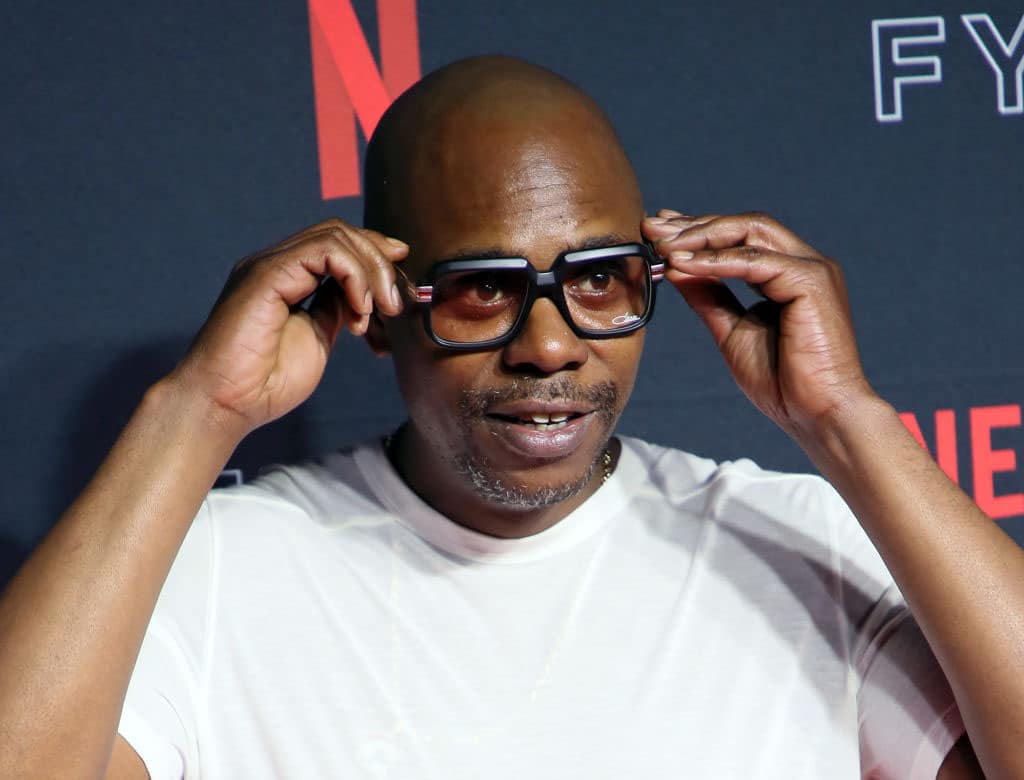 Dave Chappelle attends the Netflix FYSEE Kick-Off at Netflix FYSEE at Raleigh Studios on May 6, 2018 in Los Angeles, California. (Photo by David Livingston/Getty Images)
Dave Chappelle attends the Netflix FYSEE Kick-Off at Netflix FYSEE at Raleigh Studios on May 6, 2018 in Los Angeles, California. (Photo by David Livingston/Getty Images) It’s been many years since Saturday Night Live was a cultural touchstone in American society, but the show’s Weekend Update skit occasionally still makes relevant points about the news it satirizes. One of the faux-news items in last weekend’s program related to the recent controversy in which basketball star Kyrie Irving is enmeshed, when he was suspended for several games for tweeting a link to an antisemitic movie. After several false starts, Irving eventually apologized in an Instagram post and it now appears that his suspension will be lifted in the near future.
Anchor Michael Che’s take on the most recent media storm surrounding yet another celebrity attack on Jews was to joke that Irving had met with the Anti-Defamation League and announced that “from now on he would pretend to not be antisemitic.” Which is funny, but it would be much funnier if it weren’t so sad and so true.
Earlier in the same SNL episode, comedian Dave Chappelle addressed a much more offensive outburst than Irving’s thoughtless re-tweet when he pretended to offer advice to noted rapper Kanye West, who now goes by “Ye.” At the start of the routine, Chappelle read from a piece of paper saying, “‘I denounce antisemitism in all its forms, and I stand with my friends in the Jewish community.’
Chappelle then looked to the camera and said: “And that, Kanye, is how you buy yourself some time.”
Less funny. More offensive. But just as true and just as sad.
Chappelle himself has made antisemitic comments in the past, and he added a few more during his monologue. The fact that singers and athletes and comedians make hateful and ugly statements about Jews is nothing new. Plumbers and poets and politicians do it too. But Che’s joke touched on an uncomfortable truth – that society is willing to let these antisemites off with a slap on the wrist at worst as long as they are willing to make even the slightest effort toward faking remorse and offering the barest pretense of regret. Chapelle’s instructions for West made the same point but with less of an effort toward humor. In both cases, we were reminded of an unpleasant reality — that we no longer expect any actual effort toward real reconciliation and are willing to settle for a celebrity reading ghost-written talking points that allow all of us to act like some small amount of healing has actually been achieved.
West and Irving were penalized not for their original transgressions but for their unwillingness to play along with the script that so many others have followed for the sake of their careers.
West and Irving were penalized not for their original transgressions but for their unwillingness to play along with the script that so many others have followed for the sake of their careers. Che and Chappelle pointed out that the performative and hollow apologies that we demand don’t actually accomplish very much at all.
Despite the attention their ill-considered actions have received, I’ve tried to avoid writing about West and Irving. Their musical and athletic skills gain them attention that most equally silly and ignorant antisemites never achieve. But their views on my religion, culture and heritage shouldn’t be taken any more seriously than when the same venom is spewed by those whose day jobs do not bring them fame. Both men have large numbers of followers, though, which makes their outsized platforms more dangerous, since a disconcerting number of their fans may decide that their intolerance is an acceptable part of their performance and an important part of their success. I’ve always thought that giving these haters more attention simply helped them spread their cultural illiteracy to an even larger audience.
But now we must ask ourselves whether our decision to accept these types of empty apologies actually enables them even more, and whether antisemitism is so pervasive and tacitly accepted in contemporary society that we no longer realistically strive to move past it. There’s no real penalty for public displays of anti-Semitism for anyone willing to mumble some type of regret and pledge to learn about the Holocaust. If such a deception is now good enough for us, then there’s even less chance we’ll see any legitimate contrition or reconciliation in the future.
Dan Schnur is a Professor at the University of California – Berkeley, USC and Pepperdine. Join Dan for his weekly webinar “Politics in the Time of Coronavirus” (www.lawac.org) on Tuesdays at 5 PM.





















 More news and opinions than at a Shabbat dinner, right in your inbox.
More news and opinions than at a Shabbat dinner, right in your inbox.